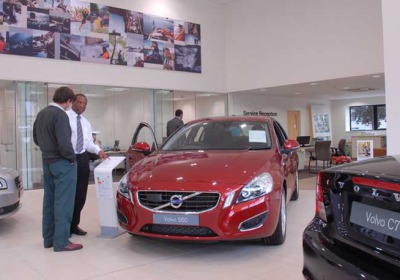UK 2010 car sales analysis: winners and losers
Fri, 07 Jan 2011The new car sales figures for 2010 were announced today, revealing the winners and losers in the UK's new car showrooms.
Perhaps surprisingly, with the ending of the scrappage scheme in March 2010, new car registrations in Britain ended up 1.8% on 2009. That was a total of 2,030,846 cars sold as new.
The bulk of the recovery was from the fleet sector, as company car sales rose by 10%; private registrations in fact fell.
Sales last year were up 20% in the first half of the year, as the Scrappage Incentive Scheme continued until March 2010. More than 100,000 cars were registered with the Government's £2000 incentive. Once those subsidies dried up, sales in the second half dropped by 14%.
Tellingly, sales to retail customers fell below 1m for only the second time in the past decade. Diesel meanwhile accounted for a record 46% of all new cars sold in Britain.
Manufacturers hitting double digit growth include premium brands such as Audi and BMW, whose ever-expanding ranges seem to appeal to British buyers' snob values. Both saw sales jump by around 10% over last year (as did Mini). Rival Mercedes saw a more modest 3% increase while the stellar jump was Infiniti - up 416%, albeit from a low base. Land Rover posted a very impressive 28% jump while inhouse sibling Jaguar tumbled by 10%.
Ford was still comfortably the number one brand, despite sales dropping 11% to 280,000. It should be watching out for a strengthening Vauxhall, whose sales nudged up 4%. Could the two converge in 2011? Probably not, as Ford ends the run-out of its key Focus and launches the new model this spring. And the Fiesta remains the year's best-selling car.
Elsewhere in the mainstream, there was success at the French brands, with Renault (up a massive 51%), Peugeot (up 7%) and Citroen (up 1%) all bouncing back from recessionary lows.
VW's budget brands Seat and Skoda were both up 10%, while Nissan - whose Qashqai jumped into the top 10 - was up a healthy 15% and a resurgent Mitsubishi rose 10%, while Subaru nudged up 4% (although it's still a fraction of its previous size in the UK). Praise to the Koreans, too: Hyundai jumped 9% and Kia 11%.
American brands have had a tough year in the UK, with many of them reorgansising after bankruptcies in the US. So it should come as no surprise that Cadillac (down 86%), Chrysler (sales slumped by 48%), Corvette (-94%), Hummer (-91% and now defunct) and Jeep (down 17%) all had miserable sales performances.
Other companies outside the States have suffered commercial meltdown and this shows in disappointing sales figures at Ssangyong (down 69%) and Saab (down 21% although the new 9-5 should help in 2011).
It wasn't just bankrupted companies having a tough time here. The Japanese importers suffered in 2010, too (excluding Nissan and Mitsubishi). Toyota, which was rocked by a recall scandal last year, saw sales slump by 15% and its upmarket wing Lexus saw a similar 15% fall despite Euro rivals growing, although Mazda kept its slowdown to 5% down.
Suzuki fell by a quarter and Honda did worse than the market, tumbling by 15%. The faltering exchange rate has been blamed for the near demise of Daihatsu, whose sales collapsed by 93% to a very lame 170 vehicles.
These brands will be worrying that the outlook for the whole UK car market in 2011 is in fact worse than 2010...
The Society of Motor Manufacturers and Traders, which compiles the figures and represents the UK industry, forecasts a 5% dip in sales this year. It predicts a market of 1.93 million sales.
'2010 was a year of recovery for the motor industry with new car registrations up 1.8% on 2009,' said Paul Everitt, SMMT chief executive. 'Economic conditions remain extremely challenging, but industry expects demand to strengthen in the second half of the year. Competition in the retail sector will intensify as the industry seeks to re-balance demand across its new and used car and service and repair business. UK motor manufacturing recovered particularly well in 2010 and the outlook is for further steady growth this year.'
By Tim Pollard

